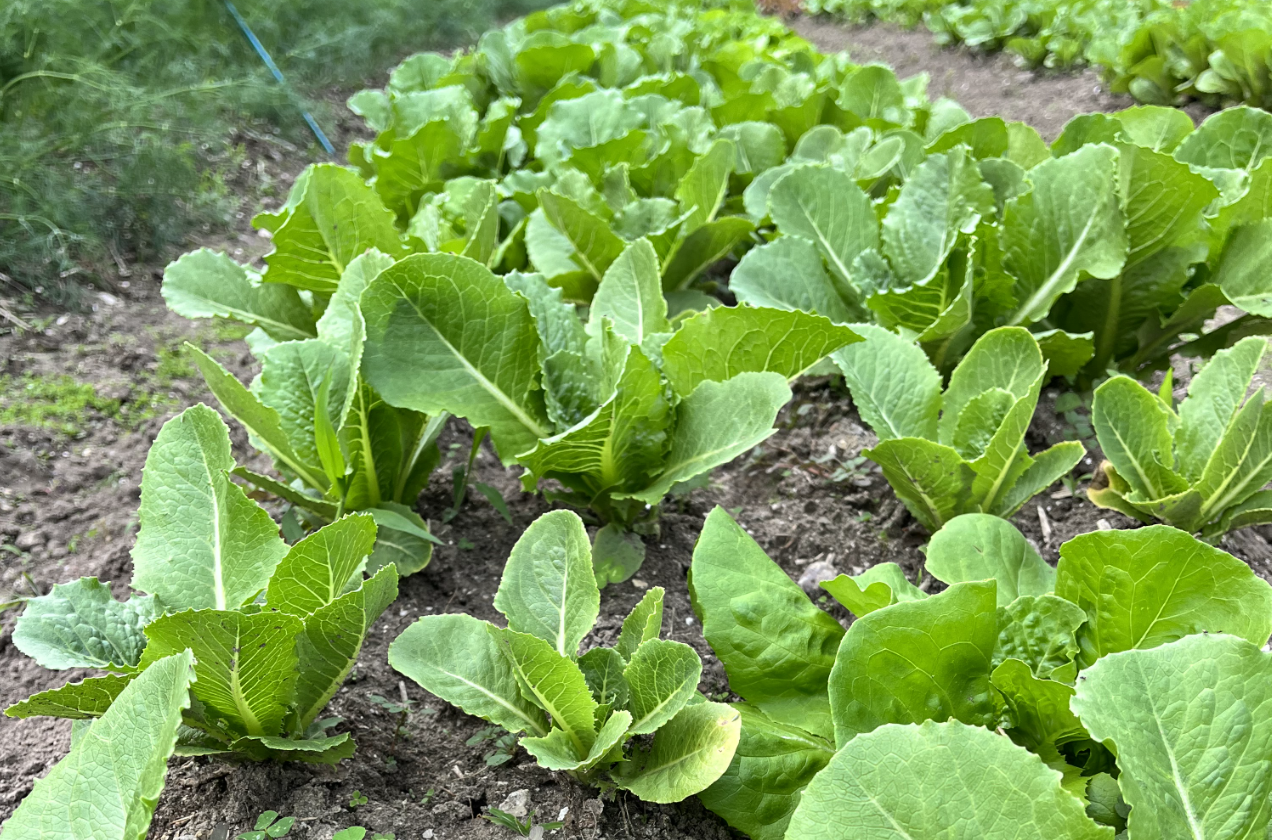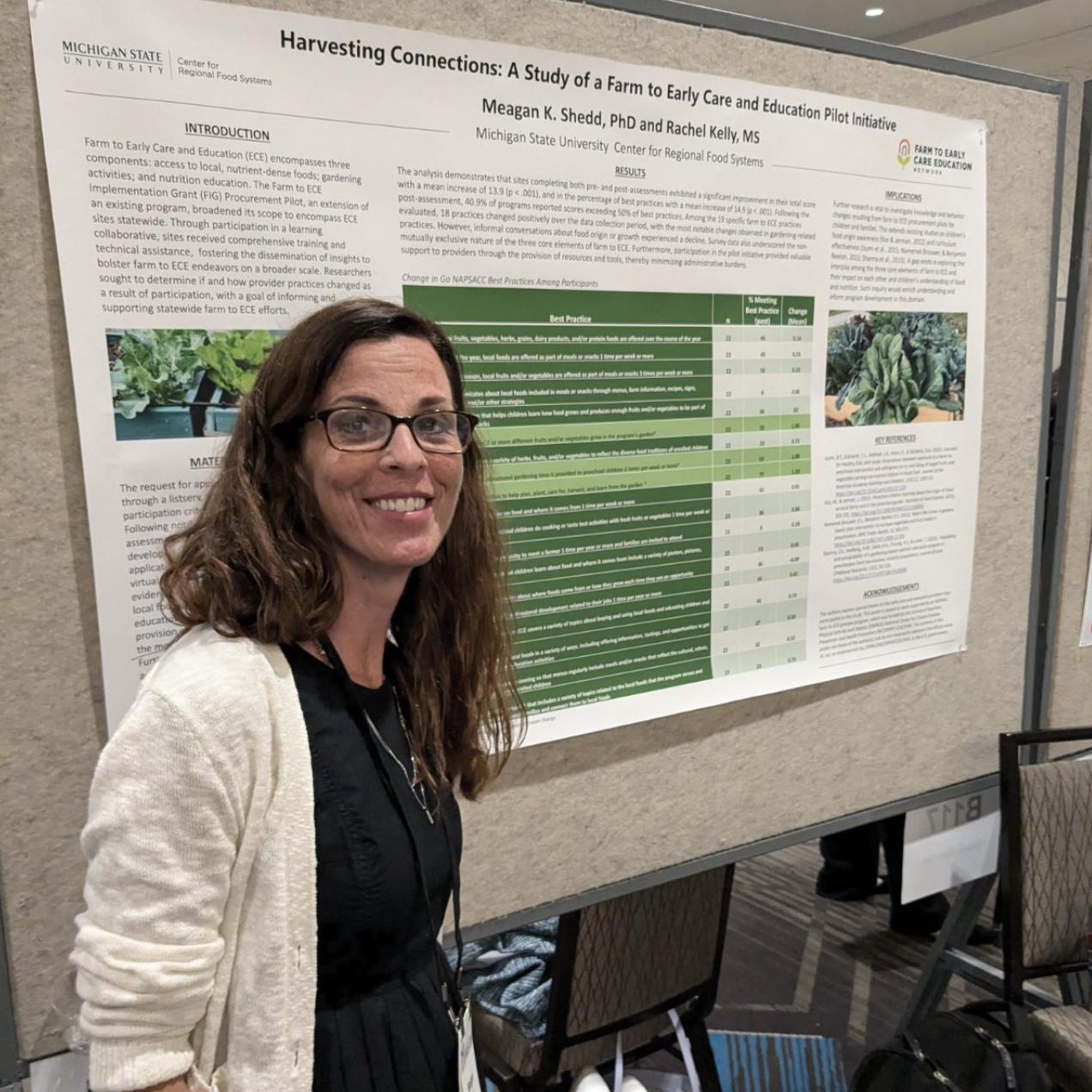Recent farm to ECE procurement pilot shared at National Research Conference on Early Childhood in Washington, D.C.
Researchers from the Michigan State University Center for Regional Food Systems aimed to assess the impact of participation on provider practices, with the goal of informing and supporting statewide farm to ECE efforts.

Farm to Early Care and Education (ECE) encompasses three components: access to local, nutrient-dense foods; gardening activities; and nutrition education. The Farm to ECE Implementation Grant (FIG) Procurement Pilot, an extension of an existing program, broadened its scope to encompass ECE sites in Michigan. Through participation in a collaborative learning program, these sites received comprehensive training and technical support. This fostered the dissemination of valuable insights to enhance farm to ECE practices on a broader scale. Researchers from the Michigan State University Center for Regional Food Systems, Meagan Shedd, Associate Professor in Farm to Early Care and K-12 Education and Rachel Kelly, Program Coordinator, aimed to assess the impact of participation on provider practices, with the goal of informing and supporting statewide farm to ECE efforts.
“One of the most exciting aspects about the Procurement Pilot was the enthusiasm from the educators, especially as they recognized the ways they were already incorporating farm to ECE into existing learning opportunities,” shared Shedd. “Our next step is to understand more about how farm to ECE activities not only positively impact learning environments, but also specific learning domains for young children.”
This research was published in the Journal of Agriculture, Food Systems, and Community Development (JAFSCD) and also shared as a research poster at the recent National Research Conference on Early Childhood (NRCEC) in Washington, D.C. June 24-26, 2024. The research shared at NRCEC is intended to focus on “knowledge gaps across programs serving young children and their families” through the presentation of topics sharing implications for policy and practice across the Early Childhood field. Of the 305 research posters selected for inclusion, three referenced nutrition, and Shedd and Kelly’s work was the only work representing farm to ECE.
The Process and Results
Early care and education sites participating in the study used a validated self-assessment farm to ECE tool at enrollment and six months later, along with a post-participation survey. They also took part in a virtual learning collaborative for exchanging challenges and evidence-based practices, received training and technical support for farm to ECE (offering free professional development credits), and additional farm to ECE resources, such as a monthly farm to ECE Procurement Pilot newsletter. Pre- and post-self assessment data underwent analysis employing the farm to ECE analysis tool created by the University of North Carolina with additional content analysis of the survey.
Analysis of the procurement pilot study revealed significant improvements among sites that completed both pre- and post-assessments. Notably, 18 out of 19 specific farm to ECE practices showed positive changes over the evaluation period, with particularly significant improvements observed in gardening-related activities. Survey findings underscored the interconnected nature of the three core farm to ECE elements.
Participation in the pilot initiative provided essential support to providers through resources and tools which reduced administrative burdens. Although the research in farm to school spans decades, peer-reviewed research in farm to ECE is newer, with this study adding to extant research, demonstrating its benefits not only to health and wellness, but support for children’s overall learning in high quality environments.

Further research is essential to investigate the impact of farm to ECE procurement pilots on knowledge and behavioral changes among children and families. This research builds upon existing studies focused on children's awareness of food origins and the effectiveness of educational curricula. There remains a gap in understanding how the interplay among the three core elements of farm to ECE influences each other and contributes to children's comprehension of food and nutrition. Addressing this gap will enrich our understanding and inform the development of future programs in this critical domain.
The authors express special thanks to the early care and education providers that participated in the study. The work was supported by an ASPHN's farm to ECE grantee program, which was funded by the Division of Nutrition, Physical Activity and Obesity (DNPAO)/ National Center for Chronic Disease Prevention and Health Promotion (NCCDPHP) /CDC/HHS. The contents of this poster are those of the author(s) and do not necessarily represent the official views of, nor an endorsement by, DNPAO/NCCDPHP/CDC/HHS, or the U.S. government.
About Michigan Farm to ECE Network
The Michigan Farm to ECE Network collaborates so children ages birth to 5 can grow, choose, and eat nutritious local food in early care and education (ECE) settings.
Learn more at mifarmtoecenetwork.org
About the Michigan State University Center for Regional Food Systems
The Michigan State University (MSU) Center for Regional Food Systems advances regionally rooted food systems through applied research, education, and outreach by uniting the knowledge and experience of diverse stakeholders with that of MSU faculty and staff. Our work fosters a thriving economy, equity, and sustainability for Michigan, the nation, and the planet by advancing systems that produce food that is healthy, green, fair, and affordable.
Learn more at foodsystems.msu.edu



 Print
Print Email
Email



